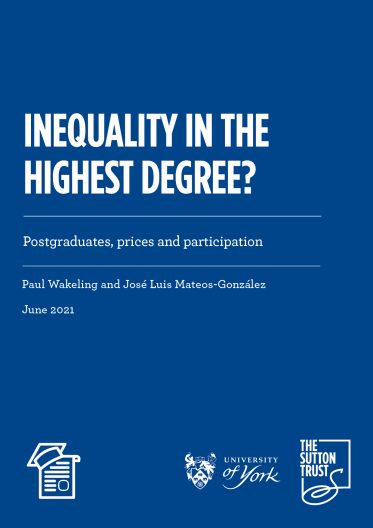1. The funding system at postgraduate level in England should be reformed, to remove financial barriers to postgraduate study. While recent reforms to postgraduate loans are welcome and have helped to widen access, there is still evidence of financial barriers deterring prospective students. This is particularly pressing at the country’s most prestigious institutions, as these tend to be more expensive both in terms of tuition fees and living costs. Instead of being a contribution, the government’s postgraduate financial support system should cover full maintenance costs for students, and the full course fee cost for all but the most expensive courses. This should ideally be through a mix of loans as well as grants for students from lower income backgrounds.
2. Universities should extend their widening access work to postgraduate level, especially at high-status institutions. This should include efforts to improve the attainment of disadvantaged undergraduate students to allow them to progress to postgraduate level. High status universities especially should look at recruiting students for postgraduate level from a range of different institutions, as well as exploring other ways to widen access, for example running postgraduate summer schools aimed at potential students from lower socio-economic backgrounds. Universities should also make use of contextual admissions at postgraduate level, taking into account the potential as well as the prior attainment of applicants.
3. Data on widening participation to postgraduate study should be regularly published by the Office for Students and/or the Department for Education (for England) and the devolved governments. As is the case at undergraduate level, universities should be required to provide data on access and outcomes, with data regularly published as an official statistical release. Having this data available can help policy makers to track progress on opening up access to this level of study.
4. In England, The Office for Students should be given strengthened responsibility to ensure fair access to postgraduate study, as it does at undergraduate level. Universities are required to submit access and participation plans for undergraduate study to demonstrate how they will widen access, and these plans should also cover efforts to widen participation at postgraduate level, with published data on postgraduate participation being used to inform their plans and track their progress. As with undergraduate level, the OfS should have a role in engaging with institutions who are not making sufficient progress.
5. Universities should ensure course fees are fair and appropriate, and they should avoid charging application fees for postgraduate courses. If universities are charging course fees above the increased level of government support outlined above, they should provide adequate financial support themselves to ensure there are no financial barriers to participation. Ideally, universities should not be charging application fees at postgraduate level, but if application fees are charged, they should be as low as possible, with waivers easily accessible to any applicants who are unable to afford them. Oversight from the Office for Students should include looking at both course and application fees, with action taken where these costs are acting as barriers to lower-income students.
6. The application process for postgraduate courses should be clear and easy to navigate, with information about courses easy to find and the application process simplified where possible. In the short term, all universities should consistently provide information on their postgraduate courses to UCAS, so that it is quick and easy to find for applicants. In the longer term, if universities decide UCAS is not the best place for this, institutions should look at ways the sector could better coordinate to improve the application process for students, especially at taught postgraduate level, for example working together to create a centralised application system between multiple institutions. Having a clear, joined up and transparent application process would benefit applicants, especially those from disadvantaged backgrounds who are less likely to have help and support with their applications. A more joined up system could also help to improve data on the application and success rates of students from different backgrounds at postgraduate level, as well as potentially reducing administrative costs for institutions.
